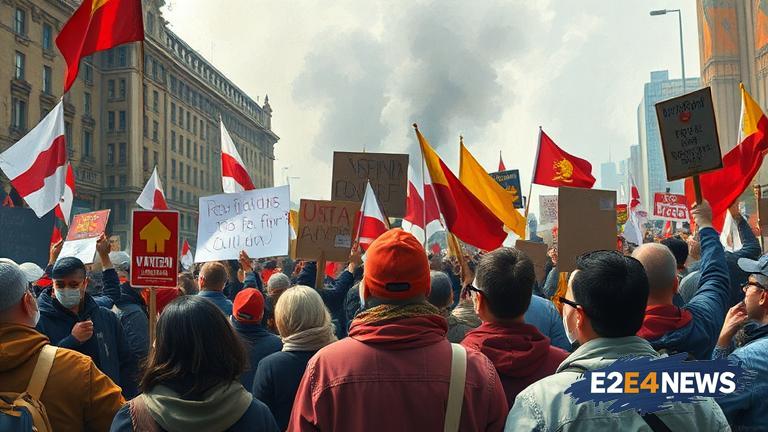The world has witnessed a surge in protests and demonstrations as workers from various countries unite to voice their discontent against government-imposed austerity measures. The protests, which have been ongoing for several weeks, have drawn attention to the plight of workers who are struggling to make ends meet due to stagnant wages, rising living costs, and dwindling social protections. In the United States, thousands of workers took to the streets to protest against the government’s proposed budget cuts, which would severely impact social security, healthcare, and education. Similarly, in Europe, workers from countries such as Greece, Spain, and Portugal have been protesting against austerity measures imposed by their governments, which have led to widespread poverty, unemployment, and inequality. The protests have also spread to other parts of the world, including Asia, Africa, and Latin America, where workers are facing similar challenges. The demonstrations have been marked by clashes between protesters and police, with many protesters being arrested and injured. Despite the challenges, the protests have shown no signs of abating, with workers vowing to continue their fight for better wages, working conditions, and social protections. The protests have also highlighted the need for greater international solidarity and cooperation among workers, who are facing common challenges and struggles. The use of social media has played a significant role in mobilizing workers and coordinating protests, with many using platforms such as Twitter and Facebook to organize and disseminate information. The protests have also drawn attention to the role of trade unions, which have been at the forefront of the struggle for workers’ rights. However, the protests have also exposed the limitations and weaknesses of trade unions, which have been criticized for their inability to effectively represent the interests of workers. The government’s response to the protests has been mixed, with some governments attempting to negotiate with protesters while others have resorted to repression and violence. The protests have also sparked a wider debate about the nature of capitalism and the need for alternative economic models that prioritize social welfare and equality. Many have argued that the current economic system is unsustainable and that a new model is needed that prioritizes human needs over profit. The protests have also highlighted the importance of international cooperation and solidarity, with many calling for a global response to the crisis. The United Nations has been criticized for its failure to address the crisis, with many arguing that the organization has been ineffective in promoting social justice and human rights. The protests have also sparked a wider discussion about the role of technology in shaping the future of work, with many arguing that automation and artificial intelligence will exacerbate existing inequalities. Despite the challenges, the protests have shown that workers are willing to fight for their rights and that a better future is possible. The protests have also highlighted the need for a more nuanced understanding of the complex relationships between workers, governments, and corporations. Furthermore, the protests have underscored the importance of education and awareness-raising, with many arguing that workers need to be better informed about their rights and the challenges they face. Additionally, the protests have emphasized the need for greater support and solidarity from civil society organizations and community groups. The protests have also raised questions about the role of the media in shaping public opinion and influencing government policy. Overall, the protests have marked a significant turning point in the struggle for workers’ rights, with many hoping that they will lead to meaningful changes and a better future for workers around the world. The protests have also shown that workers are not alone in their struggle, with many other social movements and organizations expressing solidarity and support. The international community has been called upon to take action to address the crisis, with many arguing that a global response is needed to address the root causes of the problem. The protests have also highlighted the importance of protecting workers’ rights, with many arguing that these rights are essential for promoting social justice and human dignity.
